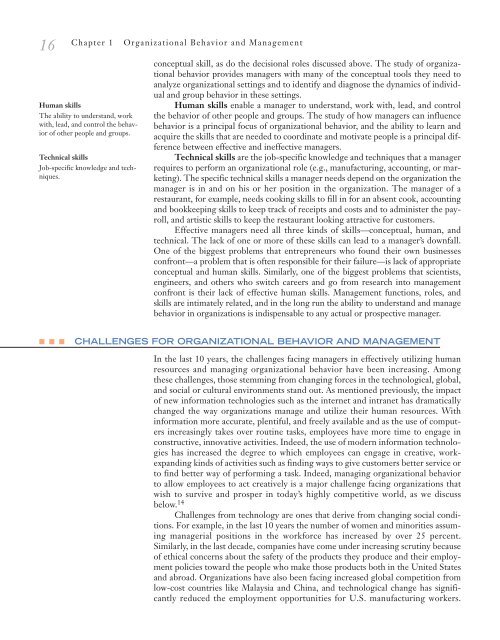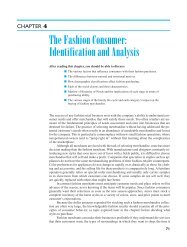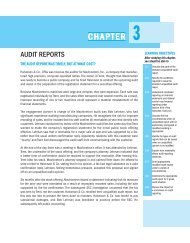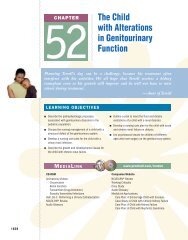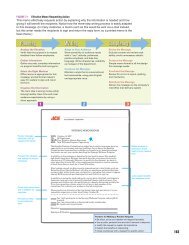chapter - Pearson
chapter - Pearson
chapter - Pearson
You also want an ePaper? Increase the reach of your titles
YUMPU automatically turns print PDFs into web optimized ePapers that Google loves.
16<br />
Chapter 1 Organizational Behavior and Management<br />
Human skills<br />
The ability to understand, work<br />
with, lead, and control the behavior<br />
of other people and groups.<br />
Technical skills<br />
Job-specific knowledge and techniques.<br />
conceptual skill, as do the decisional roles discussed above. The study of organizational<br />
behavior provides managers with many of the conceptual tools they need to<br />
analyze organizational settings and to identify and diagnose the dynamics of individual<br />
and group behavior in these settings.<br />
Human skills enable a manager to understand, work with, lead, and control<br />
the behavior of other people and groups. The study of how managers can influence<br />
behavior is a principal focus of organizational behavior, and the ability to learn and<br />
acquire the skills that are needed to coordinate and motivate people is a principal difference<br />
between effective and ineffective managers.<br />
Technical skills are the job-specific knowledge and techniques that a manager<br />
requires to perform an organizational role (e.g., manufacturing, accounting, or marketing).<br />
The specific technical skills a manager needs depend on the organization the<br />
manager is in and on his or her position in the organization. The manager of a<br />
restaurant, for example, needs cooking skills to fill in for an absent cook, accounting<br />
and bookkeeping skills to keep track of receipts and costs and to administer the payroll,<br />
and artistic skills to keep the restaurant looking attractive for customers.<br />
Effective managers need all three kinds of skills—conceptual, human, and<br />
technical. The lack of one or more of these skills can lead to a manager’s downfall.<br />
One of the biggest problems that entrepreneurs who found their own businesses<br />
confront—a problem that is often responsible for their failure—is lack of appropriate<br />
conceptual and human skills. Similarly, one of the biggest problems that scientists,<br />
engineers, and others who switch careers and go from research into management<br />
confront is their lack of effective human skills. Management functions, roles, and<br />
skills are intimately related, and in the long run the ability to understand and manage<br />
behavior in organizations is indispensable to any actual or prospective manager.<br />
■ ■ ■<br />
CHALLENGES FOR ORGANIZATIONAL BEHAVIOR AND MANAGEMENT<br />
In the last 10 years, the challenges facing managers in effectively utilizing human<br />
resources and managing organizational behavior have been increasing. Among<br />
these challenges, those stemming from changing forces in the technological, global,<br />
and social or cultural environments stand out. As mentioned previously, the impact<br />
of new information technologies such as the internet and intranet has dramatically<br />
changed the way organizations manage and utilize their human resources. With<br />
information more accurate, plentiful, and freely available and as the use of computers<br />
increasingly takes over routine tasks, employees have more time to engage in<br />
constructive, innovative activities. Indeed, the use of modern information technologies<br />
has increased the degree to which employees can engage in creative, workexpanding<br />
kinds of activities such as finding ways to give customers better service or<br />
to find better way of performing a task. Indeed, managing organizational behavior<br />
to allow employees to act creatively is a major challenge facing organizations that<br />
wish to survive and prosper in today’s highly competitive world, as we discuss<br />
below. 14<br />
Challenges from technology are ones that derive from changing social conditions.<br />
For example, in the last 10 years the number of women and minorities assuming<br />
managerial positions in the workforce has increased by over 25 percent.<br />
Similarly, in the last decade, companies have come under increasing scrutiny because<br />
of ethical concerns about the safety of the products they produce and their employment<br />
policies toward the people who make those products both in the United States<br />
and abroad. Organizations have also been facing increased global competition from<br />
low-cost countries like Malaysia and China, and technological change has significantly<br />
reduced the employment opportunities for U.S. manufacturing workers.


